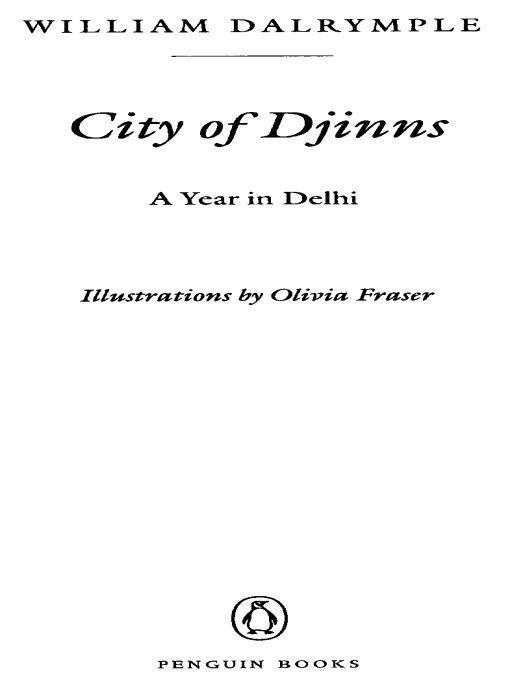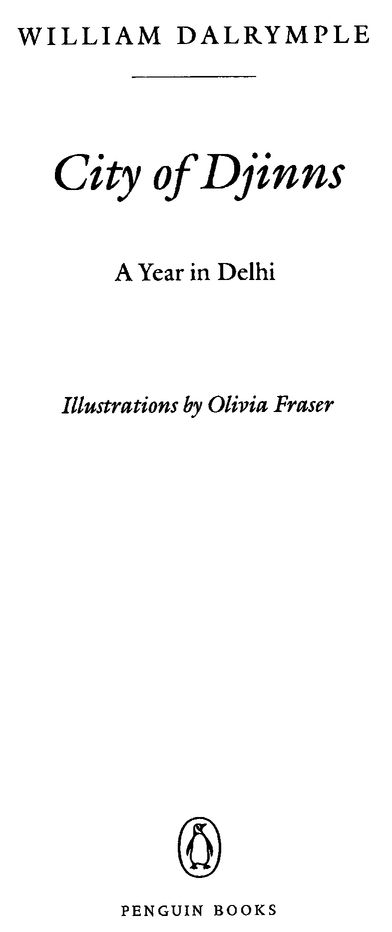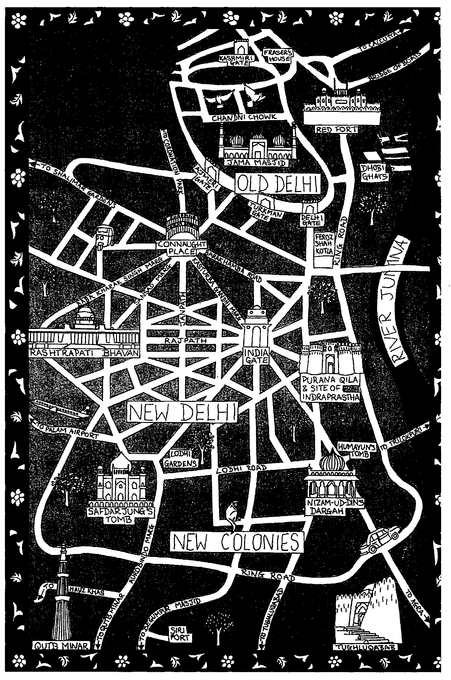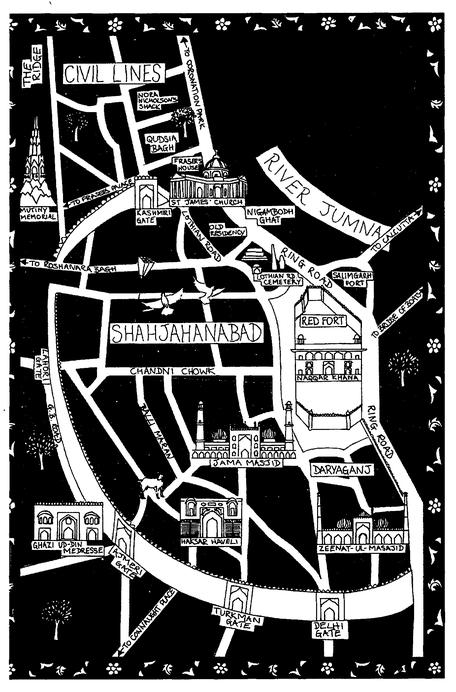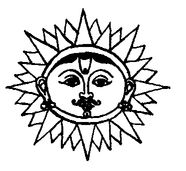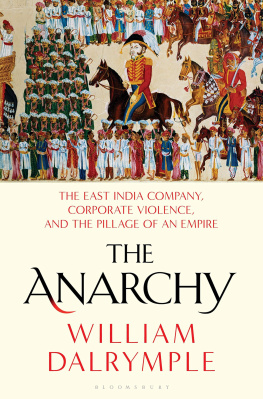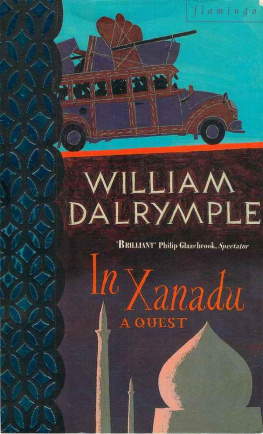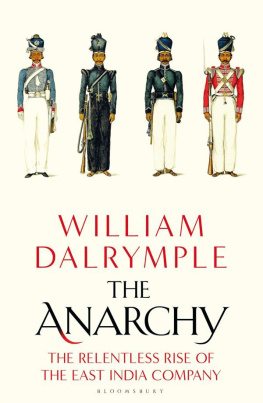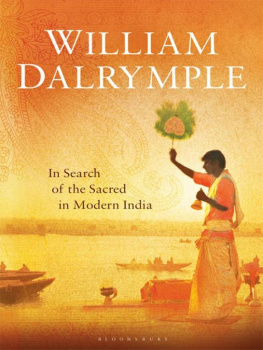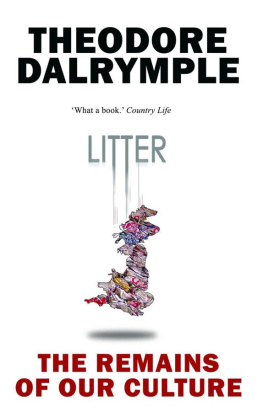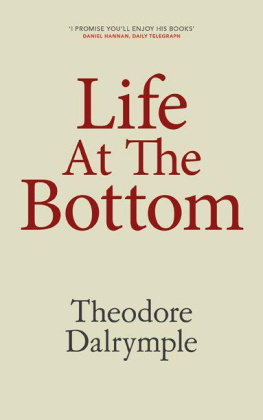Table of Contents
PENGUIN BOOKS CITY OF DJINNS
William Dalrymple is the author of several highly acclaimed books including In Xanadu, The Age of Kali, Sacred India, and From the Holy Mountain. His latest is Vikings The White Moguls. He divides his time among London, Delhi, and Edinburgh.
Praise for City of Djinns .
At a time when the book of travels is beginning to lose its fashionable allure, City of Djinns is not really a travel book at all. It is a kind of memoir recording the response of a single, gentle, merry and learned mind to the presence of an ancient city ... Dalrymple is anything but a voyeur. Even his excursions into the world of the eunuchs are conducted with a kind of grave innocence. He is more a pilgrim than an observer, always trying to understand ... hours and hours of pleasure for his readers.
Jan Morris, The Independent
Scholarly and marvellously entertaining ... A considerable feat.
Dervia Murphy, Spectator
City of Djinns is an entertaining mix of history and diary informed by a deep curiosity about the ways in which the ghosts of even the most distant past still walk Delhi in the twentieth century.
Daily Telegraph
Unlike much of modern travel writing [City of Djinns] is informative, learned and funny ... a lively and sometimes profound book.
Economist
On one level there are the amusing rites of passage, the struggles with bureaucracy the eccentricity of Dalrymples landlord, all entertaining and related. Dalrymple has a way of letting you smell and feel the city. There are beautiful chiselled descriptions of a grand capital ... but much of the books strength lies in Dalrymples skill in peeling the historical onion and showing how new Delhi resonates with the old ... A splendid tapestry.
Sunday Telegraph
A sympathetic and engaging portrait of this age-old city ... Pursuing his research through the narrow alleys, mosques, abandoned ruins and tombs of Delhi, Dalrymple encounters a range of folk who continue to give Delhi its special character. Pigeon fanciers, Sufi mystics, Moslem healers, musicians, calligraphers, philosophers and a guild of eunuchs all provide Dalrymple with entertaining insights ... It is fine, entertaining, well-written stuff, thoroughly researched but with none of the stern academic tone that so many historical profiles adopt. What sustains it, apart from his erudite knowledge, is Dalrymples sense of historical adventure. Just open your eyes, he says. If you know how to look, even the abandoned ruins of the past are alive.
Financial Times
City of Djinns is a delight. William Dalrymple is in command of his subject, seizes the reader and uses his skill to tempt and tantalize ... The city of djinns is Delhi and Dalrymple reveals it like a Dance of the Seven Veils. It is very intricately organized: ostensibly structured around a year which he and his artist wife Olivia spent in Delhi, paced by vivid descriptions of weather change as signal of seasons, and by the formal punctuation of life, learning, loving, and death ... The book is Dalrymples journey into the soul of Delhi. Books in Scotland
An expansive and inclusive work, richly peopled ... an enlightening and entertaining book.
Literary Review
Acknowledgements
This book, the story of one year in Delhi, has taken nearly four times that long to complete. It has been a long haul and on the way I have incurred debts to a great number of people whom I must now thank.
Firstly, Dominic Arbuthnott, with whom I first explored Delhi as a back-packer nine years ago. Without him I would probably never have come within a thousand miles of India in the first place. Jon Connel and Dominic Lawson both made me their Indian correspondent thus enabling me to return here; both were understanding when the book got in the way of their reports and articles. During that time, Mike Fishwick was a generous (and patient) editor, and Maggie Noach a model agent. During summer breaks in North Berwick, my parents were as long-suffering as ever.
Malcolm and Kathy Fraser let me loose on their wonderful archives: to them, particular thanks.
Salman Haidar took on the Delhi bureaucracy and got me my first residence visa; Sunil and Shalini Sethi provided shelter in Delhi until I found a house of my own. Khuswant Singh shoved me in the right direction at the beginning; he later helped with eunuchs and goddesses. Anil Seal, who taught me a little Indian history at Cambridge, helped me to secure an elusive ticket for the Nehru Memorial Library where I did the research.
Pavan Verma and Satish Jacob showed me some obscure nooks and crannies of the Old City; Dr Yunus Jaffery showed me others, and in addition kept me plied with strong hot tea and improving Sufi anecdotes. Mozaffar Alam helped with the Mughals. Siddarth and Rashmi Singh provided months of hospitality at Rohet Garh where, in a desperate bid for inspiration, I started the manuscript at the desk where Bruce Chatwin wrote The Songlines.
Several friends read through the manuscript and made invaluable comments. In Britain: Lucian Taylor, Patrick French, David Gilmour, Edward Whitley, Lucy and John Warrack, Nick and Georgia Coleridge, Fania Stoney, Elizabeth Chatwin, James Holloway, my brother Rob and my parents-in-law, Simon and Jenny Fraser. In India: Sam Miller, Navina Haidar, Tavleen Singh, Javed Abdulla, Manvender Singh, Pavan Verma, Sachin Mulji and Naveen Patnaik.
But my biggest debt by far is, of course, to my wife Olivia. Not only did she twice encourage (or rather order) me to continue when, in black moments, I decided to throw the whole thing in, she also read and edited each days work, put up with tantrums, picked up the pieces, made encouraging noises, wielded a mean red pen, quite apart from drawing the cover, the wonderful maps and pictures.
This book would, quite literally, never have been completed without her. I dedicate it to Olivia with love and affection and a big hug.
William Dalrymple
6.111.93, New Delhi
PROLOGUE
IT WAS in the citadel of Feroz Shah Kotla that I met my first Sufi.
Pir Sadr-ud-Din had weasel eyes and a beard as tangled as a mynas nest. The mystic sat me down on a carpet, offered me tea, and told me about the djinns.
He said that when the world was new and Allah had created mankind from clay, he also made another race, like us in all things, but fashioned from fire. The djinns were spirits, invisible to the naked eye; to see them you had to fast and pray. For forty-one days, Sadr-ud-Din had sat without eating, half-naked in the foothills of the Himalayas; later, he had spent forty-one days up to his neck in the River Jumna.

